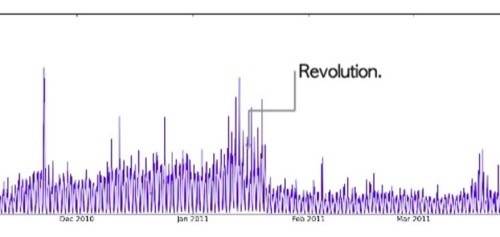At today’s Web 2.0 conference, Bit.ly Chief Scientist Hilary Mason reminded us that what we share is only a part of what we’re clicking. Her talk delved into the difference between the links we’re sharing versus the links we’re just clicking and most likely reading, and also took a look at the ways topics are discussed differently based on geography. The real focus of the talk was centered on what happens between identity and privacy, that space where the secrets of our subconscious come out.

Using word clouds, Mason looked at how pizza was discussed in New York, where slice was the biggest keyword, in Rome where it’s all about the cheese and San Francisco, which is far more artichoke-focused. If we can see how people are feeling about pizza based on their geographical location, that’s just the beginning.
Take a politician for example: Discussions about Herman Cain varied depending on geography, too. In the midwest, more people were talking specifically about his 9-9-9 plan, whereas Floridians were listening to Bill O’Reilly and South Carolina was mostly paying attention to how Cain was leading in that state’s polls. This data map shows some of the top headlines by state.

In another example, Mason looked at Bit.ly links from Tunisia over the past year, where a revolution occurred in January 2011. “The way people consume social media changes as their government changes,” said Mason. “Human activity is reflected by something so simple as the number of people clicking links.”

What Does This Mean for Privacy?
What you share is your identity, and what you read is your privacy. There’s a space in-between, and that’s what Mason is most interested in. Yesterday, 80 million links were fed into bit.ly, and 27% of those were from the U.S. She breaks it down by the top shared posts from yesterday, which include a Fast Company story about the great tech war of 2012, Teenage Mutant Ninja Turtle noses, a press release about free RIM stuff and a news article about the oldest marathon runner.
What do these all have in common? They make us go “wow,” or satisfy our entitlement to free stuff from tech companies who we feel like have screwed us over. We share those stories with our fellow man, who we believe probably feel the same way. We receive more shares, likes and clicks, and we feel better.
The top most-clicked stories from yesterday look at lot different. They probe our inner thoughts – they are our private lives, the parts we don’t share publicly. They are a story called “Know Your Neighbor: He’s Racist,” an animated boob GIF on Tumblr and a story about Hilary Duff revealing if her baby is a boy or a girl. Racism, oddly sexual imagery and ambiguous gender – is that what we’re all really thinking about? According to bit.ly, the answer is yes.
“We need better tools to curate, search and analyze in order to consciously curate the things we keep private and the things we share,” said Mason. But don’t be fooled – bit.ly isn’t trying to help you, per se – they are just trying to “build products that help people express themselves in the way they want to express themselves,” said Mason.
We might want to appear like Superman, but we’re really all a bunch of Clark Kents, right? What if we’re a little bit of both? And if we are, why shouldn’t our identity reflect that?
Images courtesy @hmason.










